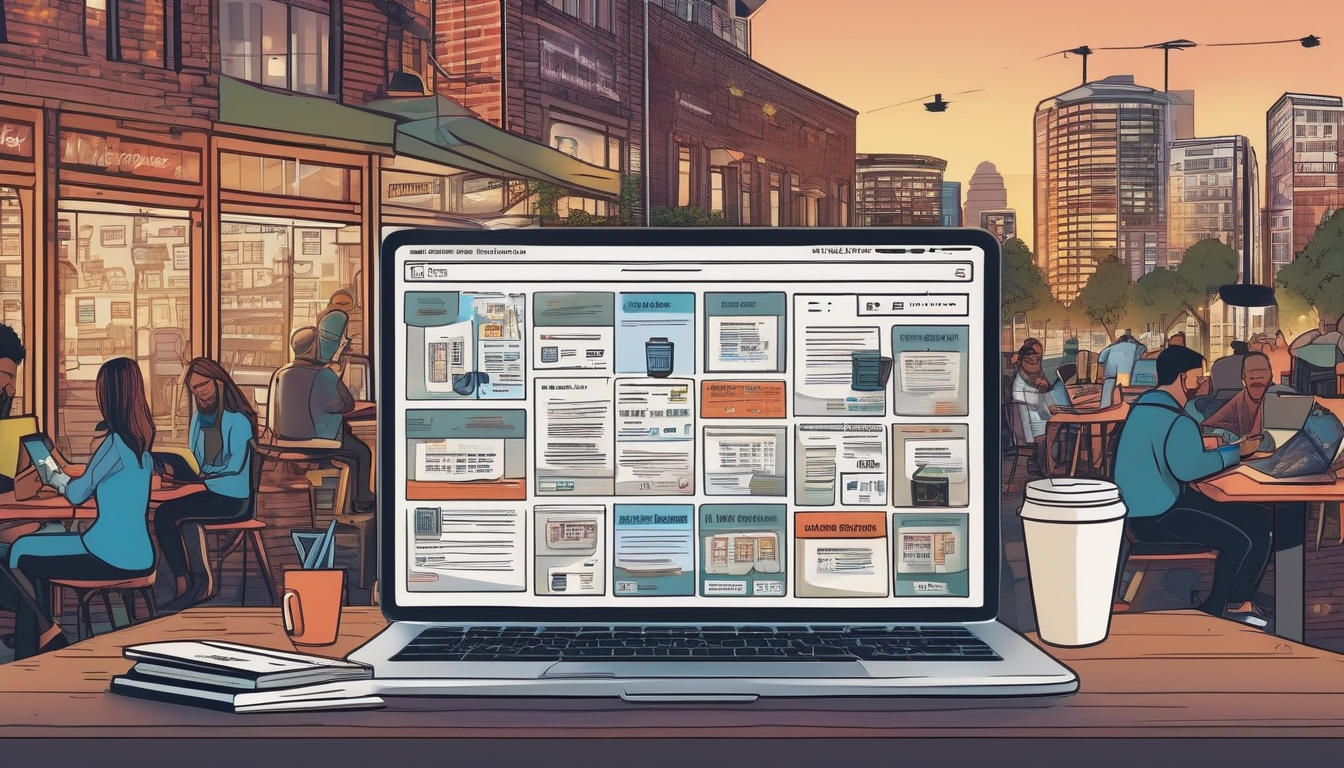How Big Tech Is Influencing the Global Economy

This article explores the significant impact of major technology companies on the global economy, examining their roles in innovation, job creation, regulation, and market dynamics.
The emergence of big tech companies has been nothing short of a revolution. Companies like Apple, Amazon, Google, and Facebook have not only grown at an astonishing pace but have also fundamentally reshaped entire industries. In just a few decades, these firms have transitioned from startups to global titans, changing the way we live, work, and interact. Can you imagine a world without smartphones or instant online shopping? These innovations have become staples of modern life, influencing consumer behavior in profound ways.
Big tech is a powerhouse of innovation, paving the way for new products and services that drive economic growth. From cloud computing to artificial intelligence, the impact of these technologies extends across various sectors. For instance, the rise of e-commerce has transformed retail, allowing businesses to reach customers worldwide. This surge in innovation not only enhances productivity but also creates new markets and opportunities. Think about it: every time a new app or service is launched, it has the potential to create jobs and stimulate the economy.
While big tech companies are often criticized for automating jobs, they also play a crucial role in job creation. These firms not only hire thousands of employees directly but also foster the growth of ancillary businesses. The gig economy is a prime example of how technology has transformed the nature of work. With platforms like Uber and Upwork, people can now find flexible work opportunities that didn’t exist a decade ago. However, this shift also raises questions about job security and benefits in an increasingly digital landscape.
Operating on a global scale, big tech firms wield significant influence over markets and trade policies. Their ability to transcend borders means they can affect economic relationships between countries. For example, when a tech giant decides to enter a new market, it can disrupt local businesses and alter competitive dynamics. This influence is a double-edged sword, fostering innovation while also creating challenges for traditional businesses.
The dominance of big tech has led to regulatory challenges that governments are scrambling to address. Issues such as data privacy, monopolistic practices, and consumer protection are at the forefront of discussions. Governments worldwide are considering new regulations to ensure fair competition and protect consumers. The question remains: how can we balance innovation with regulation without stifling growth?
Big tech has a mixed impact on small businesses. On one hand, platforms like Amazon and Facebook provide small businesses with unprecedented access to a global audience. On the other hand, the competitive pressure from these giants can be overwhelming. Many small businesses struggle to compete with the pricing and marketing power of big tech, leading to a challenging environment.
Looking ahead, the future of big tech is poised for exciting developments. Emerging trends such as increased automation, advancements in artificial intelligence, and evolving regulatory landscapes will shape the global economy. As we navigate these changes, it’s crucial to consider the implications for both consumers and businesses alike. Will big tech continue to drive growth, or will regulatory measures hinder their expansion?

The Rise of Big Tech Companies
In the past two decades, we’ve witnessed a remarkable transformation in the business landscape, largely driven by the emergence of big tech companies. These giants, including names like Amazon, Google, Apple, and Facebook, have rapidly expanded their influence, reshaping entire industries and consumer behaviors in ways we never imagined. It’s almost as if they’ve become the new industrial revolution, but instead of steam engines and factories, we’re talking about algorithms and cloud computing!
Their rise can be attributed to several key factors. First, the rapid advancement of technology has created an environment ripe for innovation. With the internet becoming ubiquitous, these companies harnessed its power to connect people, streamline services, and create entirely new markets. For instance, who would have thought that a simple app could revolutionize how we shop, communicate, and even travel? It’s like they’ve taken the concept of convenience and put it on steroids!
Moreover, these tech behemoths have redefined the consumer experience. They understand that today’s customers crave speed and efficiency. By leveraging data analytics and artificial intelligence, they anticipate our needs before we even know them ourselves. This level of personalization not only enhances user satisfaction but also fosters brand loyalty, making it hard for traditional businesses to keep up.
However, it’s essential to recognize that their growth hasn’t been without challenges. As they continue to dominate the market, questions arise about competition and fairness. Small businesses often find themselves struggling to compete against the vast resources and reach of these tech giants. This dynamic has led to ongoing debates about the need for regulation to ensure a level playing field.
In summary, the rise of big tech companies is a fascinating phenomenon that has significantly altered the global economy. They are not just businesses; they are cultural forces that influence how we live, work, and play. As we continue to navigate this digital age, it will be intriguing to see how these companies evolve and what new challenges and opportunities they will bring to the forefront.

Innovation and Economic Growth
When we think about the modern economy, innovation is the lifeblood that keeps it pumping. Major tech companies are at the forefront of this revolution, constantly pushing boundaries and redefining what’s possible. These firms don’t just create flashy gadgets; they develop cutting-edge technologies that ripple through various sectors, sparking growth and productivity. For instance, consider how the advent of cloud computing has transformed businesses. It has enabled companies of all sizes to access powerful resources without hefty upfront costs, allowing them to innovate faster than ever.
Moreover, big tech firms are responsible for groundbreaking advancements in areas like artificial intelligence, machine learning, and data analytics. These technologies are not just buzzwords; they are reshaping industries. Companies that leverage AI can analyze vast amounts of data in real-time, leading to improved decision-making and operational efficiency. This kind of innovation is a game-changer for businesses looking to stay competitive in a fast-paced market.
Let’s take a closer look at some of the key ways big tech drives economic growth:
- New Products and Services: Through continuous research and development, these companies launch products that meet evolving consumer needs.
- Increased Productivity: Automation and advanced software solutions reduce manual tasks, allowing employees to focus on higher-value work.
- Market Expansion: Tech innovations open doors to new markets, enabling businesses to reach global audiences effortlessly.
But it’s not just about the big players. The innovations sparked by these tech giants often trickle down to smaller businesses, providing them with tools and platforms that were once out of reach. Small startups can now utilize the same technologies that large corporations do, leveling the playing field and fostering a culture of entrepreneurship.
In summary, big tech’s influence on innovation is profound and multifaceted. As these companies continue to innovate, they not only enhance their own growth but also stimulate the broader economy, creating a vibrant ecosystem where new ideas can flourish. The question remains: how will these innovations shape our future?

Job Creation and Transformation
The influence of big tech companies on job creation is nothing short of revolutionary. It’s like watching a magician pull a rabbit out of a hat—one moment, there seems to be a scarcity of opportunities, and the next, a plethora of jobs materializes. These tech giants, such as Amazon, Google, and Facebook, are not just creating jobs; they are transforming the very nature of work itself.
In the past, traditional jobs often meant 9-to-5 hours in an office, but big tech has ushered in a new era. The rise of the gig economy is one of the most significant changes we’ve witnessed. With platforms like Uber and Upwork, people can now earn a living on their terms, choosing when and how much they want to work. This flexibility is a game-changer, allowing individuals to balance work and personal life in ways that were previously unimaginable.
However, it’s essential to recognize that this transformation comes with its own set of challenges. While big tech creates numerous opportunities, it also leads to job displacement in traditional sectors. For instance, retail jobs are declining as e-commerce flourishes. According to a recent study, nearly 1.3 million retail jobs were lost in the U.S. from 2017 to 2021, largely due to the rise of online shopping.
| Sector | Job Growth | Job Loss |
|---|---|---|
| E-commerce | +2 million | -1.3 million |
| Tech Development | +1 million | -500,000 |
| Traditional Retail | -1.3 million | N/A |
Moreover, as remote work gains traction, companies are redefining their hiring strategies. They can now tap into a global talent pool, which means that a skilled worker in a small town can compete for a job with someone in a bustling city halfway around the world. This shift not only broadens opportunities for job seekers but also fosters diversity in the workplace.
In conclusion, big tech is not just a catalyst for job creation; it is reshaping how we think about work altogether. As we navigate this transformative landscape, it’s crucial to adapt and embrace the changes while also addressing the challenges that come with them. The future of work is here, and it’s more dynamic than ever.

Global Market Influence
The reach of big tech companies goes far beyond their home countries; they are like the modern-day emperors of the global market. With just a few clicks, these giants can influence economies on a scale that was unimaginable a couple of decades ago. Think about it: a single decision made by a tech titan can ripple through supply chains, affect currency values, and even sway political policies across the globe. Isn’t that fascinating?
Take, for example, the way Amazon has transformed retail. Not only has it changed how we shop, but it has also dictated the terms of trade for countless small businesses worldwide. This influence extends to logistics, where Amazon’s innovations have set new standards for delivery speed and efficiency, forcing competitors to adapt or fall behind. In a sense, big tech companies are the new gatekeepers of the global market, shaping consumer expectations and behaviors.
Moreover, big tech firms often have the resources to navigate and even influence trade policies. They can lobby for regulations that favor their business models, which can shift the balance of power in international trade. For instance, Google and Facebook have been pivotal in discussions around data privacy laws, affecting how countries approach these regulations. This kind of influence raises questions about fairness and competition—who really holds the power in the global economy?
But it’s not just about power; it’s also about connectivity. These companies facilitate cross-border transactions and open new markets for businesses of all sizes. Through platforms like Alibaba and eBay, small entrepreneurs can reach customers halfway around the world, something that was nearly impossible just a few years ago. This democratization of commerce is a double-edged sword, though, as it also means small businesses must compete with well-funded tech giants.
In conclusion, the global market influence of big tech companies is profound and multifaceted. They are reshaping the landscape of international trade, consumer behavior, and even government policies. As we move forward, it will be crucial for stakeholders—governments, businesses, and consumers alike—to navigate this new reality carefully. The question remains: how will we balance innovation and competition in an increasingly tech-driven world?

Regulatory Challenges and Responses
The rapid growth and influence of big tech companies have undoubtedly reshaped our economy, but this transformation comes with a host of regulatory challenges. As these giants expand their reach, governments around the world are scrambling to keep up, often playing a game of catch-up. Have you ever tried to catch a speeding train? That’s what it feels like for regulators trying to manage the pace of innovation in technology.
One of the most significant challenges is ensuring fair competition. With companies like Amazon, Google, and Facebook dominating their respective markets, smaller businesses often struggle to compete. This has led to concerns about monopolistic practices and the need for antitrust regulations. In fact, many governments are now considering or have already implemented policies aimed at curbing the power of these tech behemoths. For instance, the European Union has been proactive, introducing the Digital Markets Act to promote competition and protect consumers.
Another critical issue is consumer protection. As big tech firms collect vast amounts of data, questions arise about privacy and the ethical use of information. Consumers are increasingly aware of how their data is used, leading to calls for stricter regulations. In response, some companies have begun to adopt more transparent data practices, but is that enough? The challenge remains for regulators to create frameworks that not only protect consumers but also foster innovation.
Moreover, the global nature of big tech complicates regulatory efforts. Different countries have varying laws and policies, creating a patchwork of regulations that can be difficult to navigate. For example, while the EU may impose strict data protection laws, other regions may have more lenient approaches. This disparity can lead to regulatory arbitrage, where companies exploit less stringent regulations in certain jurisdictions to gain an advantage.
In summary, the regulatory landscape surrounding big tech is evolving rapidly. As governments strive to balance the need for innovation with the imperative of consumer protection and fair competition, the dialogue between regulators and tech companies will be crucial. It’s a delicate dance, and the steps are ever-changing, but one thing is clear: the future of our economy will depend on how effectively these challenges are addressed.

Impact on Small Businesses
The influence of big tech on small businesses is a double-edged sword, creating opportunities while also presenting challenges. On one hand, these tech giants offer platforms that can propel small enterprises to new heights. For instance, e-commerce platforms like Amazon and Etsy allow small businesses to reach a global audience, breaking geographical barriers that once limited their growth. Imagine being a local artisan who can now sell products worldwide with just a few clicks—this is the power of big tech!
However, the flip side is that the very same platforms that enable growth can also create fierce competition. Small businesses often find themselves in a David vs. Goliath scenario, where they struggle to compete with the marketing budgets and resources of larger corporations. This competitive pressure can be overwhelming, leading to a fight for visibility in crowded marketplaces. Many small business owners worry about how they can stand out in a sea of options, especially when algorithms favor bigger players.
Moreover, big tech’s dominance can lead to increased operational costs for small businesses. For example, the fees associated with selling on platforms like eBay or Shopify can cut into profit margins, making it challenging for small businesses to sustain themselves. This is where the importance of understanding the balance between leveraging these platforms and maintaining profitability comes into play.
To navigate these challenges, small businesses are increasingly adopting innovative strategies. Some are focusing on niche markets, offering unique products that cater to specific consumer needs. Others are utilizing social media platforms for direct-to-consumer sales, effectively bypassing traditional retail channels. This shift not only enhances their visibility but also fosters a more personal connection with customers.
In summary, while big tech can significantly boost small businesses through access to wider markets and innovative tools, it also poses substantial challenges that require strategic navigation. The key for small business owners lies in harnessing the benefits of technology while remaining adaptable and resilient in the face of competition. As the landscape continues to evolve, those who can pivot and innovate will thrive in this interconnected economy.

Future Trends in Big Tech
The future of big tech is a thrilling rollercoaster ride filled with twists and turns that could reshape our world. As we look ahead, several key trends are emerging that will not only influence the technology landscape but also redefine our economic interactions and daily lives. For instance, artificial intelligence (AI) is set to take center stage, transforming everything from customer service to healthcare. Imagine a world where AI-driven tools anticipate your needs before you even voice them—sounds like science fiction, right? But it’s closer than you think!
Moreover, the rise of blockchain technology is another trend that can’t be ignored. This decentralized ledger system promises to enhance transparency and security in transactions, making it a game-changer for industries such as finance and supply chain management. Picture a future where every transaction is not only secure but also instantly verifiable—this could drastically reduce fraud and increase trust among consumers and businesses alike.
Additionally, the concept of metaverse is gaining traction. This digital universe is expected to blend virtual and augmented realities, opening up new avenues for social interaction, commerce, and even education. Companies like Meta are pouring resources into creating immersive experiences that could redefine how we connect with each other and consume content. Can you envision attending a virtual concert in your living room while interacting with friends from around the globe? That’s the metaverse in action!
However, with great power comes great responsibility. As big tech continues to expand its influence, regulatory frameworks will need to evolve to keep pace. Governments around the world are grappling with how to manage these colossal entities without stifling innovation. The challenge lies in striking a balance that promotes fair competition while protecting consumer rights. It’s a tightrope walk that will require collaboration between tech giants and policymakers.
In conclusion, the future trends in big tech are not just about technological advancements; they represent a profound shift in how we live, work, and interact. As we embrace these changes, it’s essential to remain vigilant and proactive in addressing the challenges that accompany such rapid evolution. The next decade promises to be an exhilarating journey, and we’re all on board!
Frequently Asked Questions
- What are the main ways big tech companies influence the global economy?
Big tech companies influence the global economy through innovation, job creation, and market dynamics. They drive technological advancements that lead to new products and services, which can boost productivity and economic growth across various sectors.
- How do big tech companies contribute to job creation?
While big tech companies create numerous jobs, they also transform the nature of work. This includes the rise of gig economies and remote work opportunities, allowing more flexibility but also changing traditional employment landscapes.
- What challenges do small businesses face due to big tech?
Small businesses often benefit from platforms provided by big tech, which can enhance visibility and growth. However, they also face competitive pressures that can be overwhelming, as larger firms dominate the market and resources.
- How do big tech companies affect global market dynamics?
Big tech firms operate on a global scale, influencing trade policies and economic relationships between countries. Their operations can shape market trends, affecting everything from pricing strategies to consumer behavior worldwide.
- What regulatory challenges do big tech companies face?
Big tech’s dominance presents various regulatory challenges, prompting governments to respond with measures aimed at ensuring fair competition and protecting consumers. These regulations can include antitrust laws and privacy protections.
- What future trends can we expect from big tech?
Looking ahead, we can expect emerging trends in big tech that may include advancements in artificial intelligence, further regulatory changes, and shifts in consumer behavior, all of which will have significant implications for the global economy.













